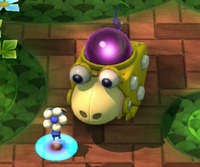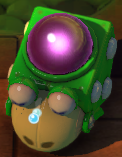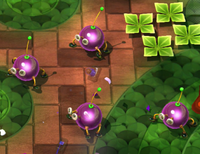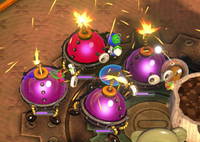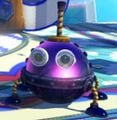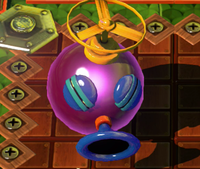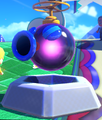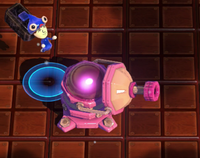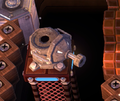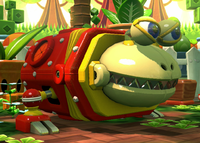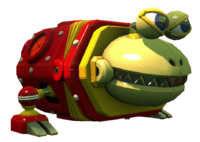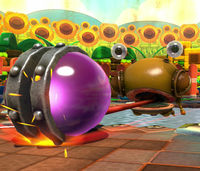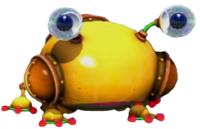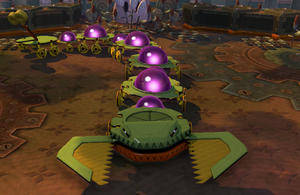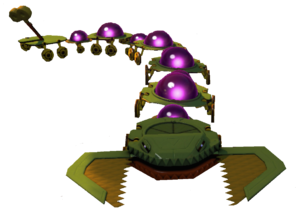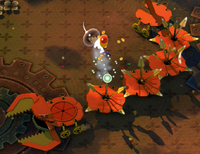Sandbox to hold my W.I.P. edits for certain articles.
Single Noun Edits
The following W.I.P.s of a few enemy articles with minor edits, the biggest of which includes using single nouns throughout.
Albino Dwarf Bulborb
The Albino Dwarf Bulborb (コチャッピーモドキ?, lit.: "Pseudo Small Chappy") is a small nocturnal enemy that only appears in Pikmin 4. This enemy resembles the Dwarf Bulborb in appearance, but has a white to red ombré back instead of a spotted one, similar to the Bulborb Larva, and additionally have slightly larger snouts compared to most Dwarf Bulborbs. These differences largely stem from both its very young age, being the first molt of a Bulborb Larva, and because it is a true member of the grub-dog family rather than a breadbug mimic.
Despite being their young, adult Bulborbs are known to cannibalize Albino Dwarf Bulborbs. In order to avoid this, they are only active at night and in caverns, where the poor visibility allows them to evade predation. The Albino Dwarf Bulborb is noticeably tougher than the Dwarf Bulborb, requiring two direct Pikmin throws to the back to dispatch.
Anode Beetle
The Anode Beetle (エレキムシ?, lit.: "Electric Bug") is a small enemy found in Pikmin 2 and Pikmin 4. This creature is blissfully unaware of Pikmin, and if found alone, is harmless; but if there is a partner nearby, an electrical barrier can be produced between the two, subjecting any nearby Pikmin to electrocution. As such, it is commonly found in groups of 2 or more.
Swarming will not harm it, as it has a protective shell, similar to the Flint Beetles. To damage it, one must throw a Pikmin on top of it to flip it over, then proceed to swarm it. Purple Pikmin can cause them to flip over even if not directly hit.
Arachnode
The Arachnode (マリグモ?, lit.: "Temari Spider") is a spider-like enemy in Pikmin 3 and Pikmin 4. While dormant on its web, the Arachnode resembles a cocoon, with a black and yellow striped and sphere-shaped body. This shape and coloring comes from the eight legs wrapped tightly around its body; its actual body is comprised of small black orbs with yellow circles instead of stripes. Once a Pikmin or leader gets caught in an Arachnode's web, it will uncurl its legs after a while, and wander up to its prey, consuming them quickly once it has reached them. It may also wander around the web freely in order to avoid Pikmin that are being thrown at it. The web will collapse once the Arachnode is defeated.
Pikmin caught in the web can be saved by whistling at them. This is important, especially with a small squad, as Pikmin shaken off by the Arachnode will usually get stuck in the web. Winged Pikmin carrying objects will get stuck in webs that are along their route, making webs the primary obstacle for these types of Pikmin.
Arctic Cannon Larva
The Arctic Cannon Larva (ユキフタクチ?, lit.: "Snow Two-Mouth") is an enemy in Pikmin 3 and Pikmin 4. It is bright green, with a lavender underbelly, and are accustomed to cold conditions. They are the larval form of the Arctic Cannon Beetle.
Unlike their rock-spitting relatives, the Arctic Cannon Larva launches giant snowballs. While mostly equivalent to boulders in functionality, snowballs are incapable of killing Pikmin, instead simply picking them up and carrying them along until they crash into something (even other snowballs); Winged Pikmin won't even be picked up by the projectiles, only knocked back. Leaders will be picked up as well, which also traps them until the snowball is destroyed. As a result, the creature is annoying at best, and is only a threat if the Pikmin it rolls away end up next to some other enemy or hazard without the player noticing, but can be killed with relative ease by any Pikmin type.
Bulborb
The Bulborb (チャッピー?, lit.: "Chappy"), known as the Spotty Bulborb in Pikmin and the Red Bulborb (アカチャッピー?, lit.: "Red Chappy") in Pikmin 2, is a common enemy found throughout the Pikmin series. The Bulborb is one of the most prominent enemies in the franchise and appear in all 4 numbered Pikmin games. It also has apperances in Hey! Pikmin, Pikmin Adventure, Pikmin Short Movies, has several pieces of merchandise based on it, and are the focus of the first game's North American boxart. The Bulborb is the most commonly encountered member of the particularly extensive and diverse Grub-dog family.
The Bulborb has pointed snouts, eyes on stalks, and a red back with white spots. It only has two sharp fangs on either side of its mouth. It is a largely nocturnal creature and spends much of its time sleeping, only waking up when detecting potential prey, or during the night. It is often found sleeping near Dwarf Bulborbs, which are actually members of the Breadbug family.
Yellow Wollyhop
The Yellow Wollyhop (イモガエル?, lit.: "Potato Frog"; known as the Yellow Wollywog depending on the game and region) is a frog-like enemy found in the Pikmin games. It is a large, round, yellow creature with large eyes and beady pupils, and short front legs with larger hind legs. Its skin is tinted green towards the top of its head, with green spots along the sides. It can usually be found in or around large, open-air bodies of water, but also in moist, rainy areas.
It is known to leap into the air, floating temporarily, and dropping, with the intent of landing on and crushing any Pikmin below, a behavior which is most readily explained as an attempt to drive predators away from developing eggs. According to Olimar's notes, these are Wolpole eggs, revealing that the Yellow Wollyhop and the Wolpole are the same exact species.
It is the only mature species of amphituber in both Pikmin 3 and Hey! Pikmin. In these games, they also have a reasoning for it's floating ability: it's throat inflates, presumably allowing it to float in the air temporarily. In Hey! Pikmin, it seems to have slightly increased in size and move slightly faster.
Pikmin Adventure Enemy List
The following lists the appearance of enemies in each level in Pikmin Adventure.
Enemies found in Bulborb Forest
Red Bulborb x9
Creepy Beeb x17
Yellow Bulborb x1
Enemies found in Boss of the Beebs
Red Bulborb x18
Creepy Beeb x14
Yellow Bulborb x1
King Beeb x3
Enemies found in Five Seconds to Takeoff
Creepy Beeb x28
Red Bulborb x1
Enemies found in Overthrow the Bulblord
Bulblord x1
Enemies found in Cannon Smash
Creepy Beeb x15
Yellow Bulborb x8
Red Bulborb x9
Telescoping Pumphog x8
Enemies found in King Beeb is Back
Red Bulborb x15
Yellow Bulborb x14
Telescoping Pumphog x7
Creepy Beeb x30
King Beeb x1
Enemies found in Through the Darkness
King Beeb x15
Telescoping Pumphog
Red Bulborb x7
Yellow Bulborb x5
Enemies found in Swamp Master
Large-mouth Wollywog x1
Enemies found in Lord of a Barren Land
Blowhog x5
invincible Telescoping Pumphog x8
Bombardier Beeb x5
King Beeb x4
Red Bulborb x10
Yellow Bulborb x4
Bilious Bulborb x1
Enemies found in Burst the Giant Balloon
Bombardier Beeb x9
Red Bulborb x7
Yellow Bulborb x5
Telescoping Pumphog x3
King Beeb x4
Blowhog x7
Enemies in Pikmin Adventure Rewrite
The following W.I.P. is a rewrite of the Pikmin Adventure enemies page.
Bulborb
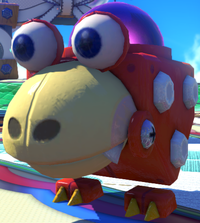
The Bulborb is the most common Bulborb color variant found in Pikmin Adventure, and is found in almost every level. The small variant is the most common one found, but there are larger ones that are found in certain areas.
Strategy
The Bulborb is one of the easiest enemies to kill in Pikmin Adventure. When it sees a player, it either charges a dash in a straight line or tries to eat players close to it. It is easy to dodge its charge, but can cause a knockout if the player isn't careful. If the Bublorb is able to catch a player, it will toss them up, eat them, and turn them into a Bulborb Dropping, making it impossible for them to be whistled at or attack enemies. In this state, the player must be broken out by Olimar or other Pikmin.
The only weak spot the Red Bulborb has is on its back which, due to its quick speed and jumpy movements, makes it somewhat challenging for one to hit. On top of this, the Bulborb will also try to shake off Pikmin currently on its weak spot, causing them to be knocked over for a little bit. There are ways to circumvent the Bulborb's movement and shaking, however, either by moving out of its sight while it is biting or wait for it to start panting. These are the prime times to attack the Bulborb since it won't be able to shake off the Pikmin on its back until after it starts trying to move.
Monita's notes
![]() US version: “These grub-dog predators tend to sleep during the day and attack aggressively if woken from a nap. Bulborbs come in a wide variety of colors--now on sale at our gift shop!”
US version: “These grub-dog predators tend to sleep during the day and attack aggressively if woken from a nap. Bulborbs come in a wide variety of colors--now on sale at our gift shop!”
![]() European version: “These Grub-dog predators tend to sleep during the day and attack aggressively if woken. ◆ Bulborbs come in a variety of colours and are now on sale at our souvenir shop.”
European version: “These Grub-dog predators tend to sleep during the day and attack aggressively if woken. ◆ Bulborbs come in a variety of colours and are now on sale at our souvenir shop.”
Names in other languages
| Language | Name | Meaning | Notes |
|---|---|---|---|
| チャッピー? Chappī |
Chappy | ||
| Bulborb | |||
| Bulborbe | |||
| Punktkäfer | |||
| Coleto | Bulborb | ||
| Orbolbo | |||
| Bulbo | |||
| Клубнеголов |
Yellow Bulborb
The Yellow Bulborb is a common Bulborb variant found in Pikmin Adventure, and acts as the first mini-boss in the attraction. The Yellow Bulborb is first encountered large, but smaller versions are also commonly encountered.
Strategy
The Yellow Bulborb unlike other Bulborb varients, does not charge at far away players, instead opting for shooting a projectile to attack the player with. On top of this the Yellow Bulborb hops around often to get closer to the player and dodge Pikmin thrown at it.
The Yellow Bulborb can spew orbs of water that ensnare players, rendering them helpless until they are freed, or a Spike Ball, which will knock out a player that gets hit by it. If a player is trapped in a water bubble, they have to be freed by having other Pikmin attack them, similar to Bulborb Droppings.
Green Bulborb
The Green Bulborb is a semi-common Bulborb variant found in Pikmin Adventure. It usually appears in groups, requiring players to either take on a small group or in some cases, simply run away from them.
Strategy
The Green Bulborb unlike other Bulborb variants, can only charge at the player on sight and has no other attacks, but it can follow the player when charging, unlike the Red Bulborb, which only travels in a straight line. Once it finishes a charge, it will start panting, being a great time to attack ot like other Bulborbs. It should be noted, however, that Green Bulborbs are usually spawned near bombs, rocks, or a bottomless pit available near them, so it would be advised that if the player is low on hearts, to simply take them out with bombs and rocks from afar or lure them into pits.
Gallery
Bilious Bulborb
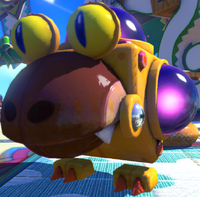
The Bilious Bulborb is the rarest standard variant of Bulborb found in Pikmin Adventure, and is the second mini-boss the player fights. Its eyes and colors resembles that of the Orange Bulborb from Pikmin 2. It has smaller spots than other Bulborbs, so it is suggested by Monita that it may not be part of the Bulborb subspecies.
Strategy
Rather than charging at the player on sight like most other Bulborbs do, the Bilious Bulborb will instead stand in place and shoot Spike Balls or water out of its mouth. It will still sometimes charge at players however. The best way to defeat the Bilious Bulborb is with multiple players. Have the Olimar player run around it so the other Mii Pikmin can get to the weak-points dotting its back. Fortunately, the arena may have rocks at its edges. If it does, Olimar or the Pikmin can pick them up to throw them at the Bilious Bulborb. If the rocks hit the creature on a weak-point or directly on its face, it will be stunned for a few seconds. If utilized properly, the rocks can turn the tide in a losing battle and save the players.
Monita's Notes
![]() US version: “The different-sized spots suggest that these may not be a true subspecies of Bulborb at all. Or perhaps they're just normal Bulborbs feeling a little under the weather.”
US version: “The different-sized spots suggest that these may not be a true subspecies of Bulborb at all. Or perhaps they're just normal Bulborbs feeling a little under the weather.”
![]() European version: “The different-sized spots suggest that these may not be a true subspecies of Bulborb at all. ◆ Or perhaps they're just normal Bulborbs feeling a little under the weather.”
European version: “The different-sized spots suggest that these may not be a true subspecies of Bulborb at all. ◆ Or perhaps they're just normal Bulborbs feeling a little under the weather.”
Names in other languages
| Language | Name | Meaning | Notes |
|---|---|---|---|
| テンテンチャッピー? Tenten Chappī |
Dotted Chappy | ||
| Galkleurige Bulborb | |||
| Bulborbe putride | |||
| Bleich-Punktkäfer | |||
| Coleto bilioso | Bilious Bulborb | ||
| Orbolbo Biliar | |||
| Bulbo bilioso | |||
| Желчный клубнеголов |
Creepy Beeb
The Creepy Beeb (known as the Worker Baub in the European version of Pikmin Adventure) is the most common enemy found in Pikmin Adventure. It is a purple orb with four flexible legs with black feet, stalked googly eyes, and an antenna coming out of the top of its head.
Strategy
The Creepy Beeb comes in various sizes: small, easy-to-kill Beebs that appear often, medium, still easy-to-kill Beebs usually found in more dangerous groups, and large Beebs that bears a striking resemblance to the King Beeb. The Creepy Beeb attacks by rolling forward a short distance that can take out careless players. The smaller Beebs are the easiest enemies to kill, as they can die in one direct hit and get weighed down by a single Pikmin due to their entire body being a single weak-point. It only rolls forward a little bit, so avoiding its attack is very simple. The larger Beebs take slightly more hits to kill, but are still very simple to get rid of as their attacks are the same as the small ones.
The larger ones curl up into a ball to roll around continuously, crushing anything in their path. These types must be attacked when they are not rolling, or the player can also use rocks and bombs if available to stop them from rolling and daze them. They have a lot more health than the small and medium Creepy Beebs.
Monita's Notes
![]() US version: “Creepy Beebs are about the size of Olimar and move in packs. They're usually quite peaceful creatures, but their flexible legs and formidable charge attack help them when they feel threatened.”
US version: “Creepy Beebs are about the size of Olimar and move in packs. They're usually quite peaceful creatures, but their flexible legs and formidable charge attack help them when they feel threatened.”
![]() European version: “Worker Baubs are about the size of Olimar and move in groups. These industrious creatures are usually peaceful, but their flexible legs and formidable charge help them when they feel threatened.”
European version: “Worker Baubs are about the size of Olimar and move in groups. These industrious creatures are usually peaceful, but their flexible legs and formidable charge help them when they feel threatened.”
The Creepy Beeb statue as seen in the Nintendo Land Plaza.
Names in other languages
| Language | Name | Meaning | Notes |
|---|---|---|---|
| ザコワラジ? Zako Waraji |
Small Fry Woodlouse | ||
| Werkbaub | |||
| Brok rampant | |||
| Krümelkugelkäfer | |||
| Pidolino operaio | |||
| Baub Operário | |||
| Boloide obrero | |||
| Тапколап-рабочий |
Bombardier Beeb
The Bombardier Beeb (known as the Bombardier Baub in the European version of Pikmin Adventure) is one of the rarer enemies seen in Pikmin Adventure. It is a variant of the Creepy Beeb that explodes after a few seconds of spotting a player. It has a number of common characteristics to the Creepy Beeb with the black feet and googly eyes, but it also has a few major differences as well including rivets on its sides and a fuze in place of an antenna.
Strategy
Upon spotting a player, the Bombradier Beeb will activate the fuse on its head and chase them. After about 5 seconds, it will stand in place and panic for a second before exploding, causing an explosion that will damage nearby players, enemies, and destructible blocks similar to standard bombs.
The Bombardier Beeb can be used to the players' advantage to destroy enemies and obstacles, but one must be careful to not get caught in the blast radius, or else they will be engulfed in the explosion.
Monita's Notes
![]() US version: “This creature is equipped with a fuse and will detonate when approached. Whatever you do, don't go anywhere near it carrying something flammable. Or inflammable, for that matter.”
US version: “This creature is equipped with a fuse and will detonate when approached. Whatever you do, don't go anywhere near it carrying something flammable. Or inflammable, for that matter.”
![]() European version: “This creature is equipped with a fuse and will detonate when approached. ◆ Whatever you do, don't go anywhere near it carrying something flammable. Or inflammable for that matter.”
European version: “This creature is equipped with a fuse and will detonate when approached. ◆ Whatever you do, don't go anywhere near it carrying something flammable. Or inflammable for that matter.”
The Bombardier Beeb statue as seen in the Nintendo Land plaza.
Names in other languages
| Language | Name | Meaning | Notes |
|---|---|---|---|
| サクレワラジ? Sakure Waraji |
Bursting Woodlouse | ||
| Bombaub | |||
| Brok à retardement | |||
| Knallkugelkäfer | |||
| Pidolino bombardiere | Bombing Beeb | ||
| Baub Bomba | |||
| Boloide bomba | |||
| Тапколап-бомбардир |
Blowhog
The Blowhog (known as the Puffy Blowhog in the European version of Pikmin Adventure) is a rare enemy that appear in Pikmin Adventure's later levels. They attack by charging a needle from their snouts before proceeding to charge at the players.
Strategy
Instead of blowing air at Pikmin like traditional Blowhogs, the Blowhog turns its snout into a spike and tries to ram the players head-on.
The entire body is a weak point similar to the Creepy Beeb, making attacking them somewhat easier then with most enemies. However, they are mobile, making precision in throwing slightly difficult, and they usually hover over pits, making it difficult to throw Pikmin at them without losing them. Sometimes they will float over solid ground to combat the player, so it is best to attakck it then.
Monita's Notes
![]() US version: “This unfriendly beast attacks by shooting needles from its mouth but mellows considerably after the initial assault. Still, a balloon with needles inside of it... That sounds like a dangerous combination!”
US version: “This unfriendly beast attacks by shooting needles from its mouth but mellows considerably after the initial assault. Still, a balloon with needles inside of it... That sounds like a dangerous combination!”
![]() European version: “This unfriendly beast attacks by shooting needles from its mouth but mellows considerably after the initial assault. ◆ Still, a balloon with needles inside it... That sounds like a dangerous combination!”
European version: “This unfriendly beast attacks by shooting needles from its mouth but mellows considerably after the initial assault. ◆ Still, a balloon with needles inside it... That sounds like a dangerous combination!”
The Blowhog statue as seen in the Nintendo Land Plaza.
Names in other languages
| Language | Name | Meaning | Notes |
|---|---|---|---|
| フーセンドックリ? Fūsen Dokkuri |
Balloon Tokkuri | ||
| Opgeblazen Blowhog | |||
| Puffy volant | |||
| Ballonerus | |||
| Moschita vacua | |||
| Sopro Voador | |||
| Verraco volador | |||
| Толстый ветросвин |
Telescoping Pumphog
The Telescoping Pumphog is a common enemy found in Pikmin Adventure Some are completely stationary and are easy to kill. Others delve underground and pop back up to shoot projectiles. It bears a resemblance to the Fiery Blowhog found in the Pikmin Series. When she was younger, Monita called them "Huffy Puffers", which spoofs the sentence "I'll huff, and I’ll puff and, I’ll blow your house down!" in folklore.
Strategy
The Telescoping Pumphog is usually found guarding a Draft Jumper to the level's next area or simply barricading an important path. When stationary, they sit about, facing a set direction. When it notices a player, it will rise up, revealing its tube-like under-segment which inflates. They then push down, which fires out a projectile from their snouts. This projectile is usually a Spike Ball, but there are a few variants that shoot bombs, water, and in rare cases, homing missiles.
Its weak-spot is located directly on its head, making it hard to hit when they rise up to charge their attack. However, when they are on the ground, right after attacking, they are extremely vulnerable, so it is advised to attack them then.
It should be noted, however, that some variants of this enemy do not have a weak-point at all, making them the only enemy in Pikmin Adventure that is completely invincible. If one were to come across this variant, try to advance to the next part of the level quickly while avoiding the indestructible Pumphog's projectiles.
Monita's Notes
![]() US version: “This creature compresses air in its bellows-shaped body and uses the pressure to shoot water or projectiles. I called them Huffy Puffers in my younger days. Oh, the quirks of a single core processor.”
US version: “This creature compresses air in its bellows-shaped body and uses the pressure to shoot water or projectiles. I called them Huffy Puffers in my younger days. Oh, the quirks of a single core processor.”
![]() European version: “This creature compresses air in its bellow-shaped body and uses the pressure to shoot water or projectiles. ◆I called them Huffy Puffers in my younger days. Oh, the quirks of a single-core processor.”
European version: “This creature compresses air in its bellow-shaped body and uses the pressure to shoot water or projectiles. ◆I called them Huffy Puffers in my younger days. Oh, the quirks of a single-core processor.”
The Telescoping Pumphog statue extending upward.
Names in other languages
| Language | Name | Meaning | Notes |
|---|---|---|---|
| ポンプドックリ? Ponpu Dokkuri |
Pump Tokkuri | ||
| Blaasbalgblowhog | |||
| Souffy téléscopique | |||
| Pump-Ballonerus | |||
| Eruptor telescopico | |||
| Sopro Telescópico | |||
| Verraco fuelle | |||
| Телескопический ветросвин |
Bosses
There are the following bosses in Pikmin Adventure:
- Bulblord
- Large-Mouth Wollywog
- Emperor Pinchipede
- Bladed Beeb
- Grand Bulblord
- Translucent Wollywog
- Monochromatic Pinchipede
- Greater Studded Beeb
See also
Pikmin Adventure Boss Edits
The following W.I.P.s are smaller edits of the various Pikmin Adventure boss pages.
Bulblord
The Bulblord (トノサマチャッピー?, lit.: "Lord Chappy") is the second major boss in Pikmin Adventure. It has characteristics resembling the Empress Bulblax from Pikmin 2 and the Emperor Bulblax from Pikmin.
Monita's Notes
![]() US version: “With its sharp teeth and devastating roll attack, this is a foe to fear. I highly advise you to take caution if you don't want to get crushed into scrap metal!”
US version: “With its sharp teeth and devastating roll attack, this is a foe to fear. I highly advise you to take caution if you don't want to get crushed into scrap metal!”
![]() European version: “With its sharp teeth and devastating roll attack, this is a foe to fear. ◆ Take Bulblords on one at a time or you'll end up with Pikmin pâté!”
European version: “With its sharp teeth and devastating roll attack, this is a foe to fear. ◆ Take Bulblords on one at a time or you'll end up with Pikmin pâté!”
Strategy
|
The following article or section contains guides. |
The Bulblord is an incredibly large Bulborb that has weak spots all over it, but its bulk and attack speed makes attacking it difficult.
Its main attack is a charging-bite in which it dashes across the whole stage in a single direction. Its other attack involves the retraction of its legs and weakpoints and rolling from side-to-side across the stage, much like the Empress Bulblax. It is advised to use a strategy similar to the one used to defeat the Bilious Bulborb, as getting it to turn around in single player is hard; simply have Olimar run behind it, causing it to turn around. While still dodging its attacks, get the other Mii Pikmin to attack its weak points.
After all its weakpoints have been destroyed, it will gain 2 new ones on its knees. It is best to use the distracting method to aim at these, as the Bulblord will begin to move much faster once these are exposed.
Once both of its legs are destroyed, it will helplessly roll onto his back, revealing its largest, final weakpoint on its underbelly. Simply throw all your Pikmin and destroy it, which will causing the Bulblord to roar in agony before exploding into Nintendo Land Coins, the park's currency. After defeating the Bulblord, it is possible to unlock it as a statue in the Plaza.
Destroying both of the Bulblord's eyes will reward the player with a stamp, the Eyes of the Bulblord.
Naming
- See also: Grub-dog family#Naming.
Names in other languages
| Language | Name | Meaning | Notes |
|---|---|---|---|
| トノサマチャッピー? Tonosama Chappī |
Lord Chappy | ||
| Bulblord | |||
| Bulblord | |||
| Oberpunktkäfer | Chief Bulborb | ||
| Bosscoleto | Boss-Bulborb | ||
| Lordbolbo | |||
| Bulbo feroz | |||
| Клубнекороль |
Gallery
Large-mouthed Wollywog
The Large-Mouth Wollywog (オオグチイモガエル?, lit.: "Big-mouthed Potato Frog"; known as the Largemouth Wollyhop in the European version of Pikmin Adventure) is the second major boss fought in Pikmin Adventure. It resembles a Yellow Wollywog with a large, gaping mouth and a long tongue with either a weak point or a Spike Ball at the end.
Monita's Notes
![]() US version: “The dreaded master of the swamp, this alien creature wields its tongue like a lead-plated yo-yo. It also has the ability to absorb great quantities of water to keep its skin nice and slimy.”
US version: “The dreaded master of the swamp, this alien creature wields its tongue like a lead-plated yo-yo. It also has the ability to absorb great quantities of water to keep its skin nice and slimy.”
![]() European version: “The dreaded master of the swamp, this alien creature wields its tongue like a lead-plated yo-yo. It also has the ability to absorb great quantities of water to keep its skin nice and slimy.”
European version: “The dreaded master of the swamp, this alien creature wields its tongue like a lead-plated yo-yo. It also has the ability to absorb great quantities of water to keep its skin nice and slimy.”
Strategy
|
The following article or section contains guides. |
The Large-Mouth Wollywog is different from most Wollywogs in the sense that, rather than attacking by jumping on Pikmin, it attacks by unraveling its spiked tongue out of its large, gaping mouth.
The Large-Mouth Wollywog sits in a pond in the center of the stage. As soon as the battle starts, you must continuously be moving to ensure the creature's tongue does not hit you. Staying near the edges of the pond will make it easier to dodge, since the boss has a hard time rotating while on this phase. Once its tongue stops on the third time, it will hit the creature's face on its way back, dazing the beast and allowing its tongue to be attacked. Once its tongue is damaged enough, it will attack at a much faster pace. However this time, the tongue becomes a Spike Ball and its new weak points become its cheeks.
Once these are destroyed, the Wollywog will begin to jump wildly across the stage counterclockwise, and after four hops (two small, two large), it will shoot out its tongue. Stay on the opposite side of the arena during this, and dodge the attacks. Once the Wollywog finishes, quickly chase after where it is going to land and stay near it. Circle it so that you are always on its back, making it easy to dodge the tongue. When it finishes its attack, use the fact that you're close and behind it to shoot an onslaught of Pikmin. Once this weak spot has been destroyed, it will be defeated, and explode into Nintendo Land Coins.
Names in other languages
| Language | Name | Meaning | Notes |
|---|---|---|---|
| オオグチイモガエル? | |||
| Breedgebekte Wollyhop | |||
| Wog Sauteur à Grande Gueule | |||
| Großmaul-Orcalog | |||
| Ranuca idropica boccamagna | |||
| Batrassalto de Boca Larga | |||
| Sapo gigante bocazas | |||
| Большеротый вопапрыг |
Gallery
Emperor Pinchipede
The Emperor Pinchipede (ダイオウハサミムカデ?, lit.: "Great King Scissors Centipede") is the third major boss encountered in Pikmin Adventure. It is a centipede like creature with a green side with weak spots and an orange side featuring spikes to take out players. Its seperated appearance and mandibles bears a resemblance to the Armored Mawdad, a creature in Pikmin 3.
Monita's Notes
Strategy
The Emperor Pinchipede's body is divided into 11 segments, 9 of which have their own weakpoints. 4 of these segments are larger than the others, and are linked together by the smaller segments. Its head, which is its 1st segment, is equipped with a large pair of sharp mandibles which will instantly take out anyone in its way. It is impossible to stun it, leaving you without your stun strategy.
As the Emperor Pinchipede crawls around the battlefield, its weak points can be openly attacked. However, whenever one of the 4 larger segments is broken off, it will land back into the arena and starts to move around the stage, spinning wildly on its orange side with spikes all over it. It is best advised to take out the smaller segments first so the battlefield will be less cluttered.
After all its weak points are destroyed, it will enter its second phase, gaining 1 more on its head segment. However, it will attack by constantly compacting his body segments like an accordion before turning onto its orange side and start shooting itself across the stage. During this process, the weakpoint is also turned over, revealing spikes, making the entire body a dangerous hazard. After it finishes this attack it will immediatly start charging another attack. This time is the ideal time to attack the head.
After its head weakpoint is damaged down to half of its health, the Emperor Pinchipede will seperate from all but one segment and start constantly moving while biting. During this phase all of the other segments will once again turn to their orange sides and start moving independantly. The Emperor Pinchipede will periodically stop moving for a but before continuing to move around the stage, making for a great time to attack it while dodging the other segments.
Names in other languages=
| Language | Name | Meaning | Notes |
|---|---|---|---|
| Japanese | ダイオウハサミムカデ? | ||
| Dutch | Keizerpinchipede | ||
| French | Empereur Mille-Klak Pinceur | ||
| German | Kaiserkaufüßler | ||
| Italian | Centiciompo imperatore | ||
| Portuguese (NoE) | Centopinça Imperial | ||
| Spanish | Ciempiédulo emperador | ||
| Russian | Императорская сорокодавка |
Trivia
- The name "Pinchipede" is a combination of "pinch" and "centipede".
Greater Bladed Beeb
The Greater Bladed Beeb (キザミワラジ?, lit.: "Cutting Woodlouse"; known as the Greater Bladed Baub in the European version of Pikmin Adventure) is the fourth and final boss of the standard challenges in Pikmin Adventure. It is a large, glossy, purple praying mantis-like creature with blades on its arms. It is the only boss in Pikmin Adventure to be treated like a normal enemy in the advanced stages.
Monita's Notes
: “This alien insect is slow to wake but quick to anger. The adrenaline rush causes it to speed up and turn red with fury.”
: “This alien insect is slow to wake but quick to anger. The adrenaline rush causes it to speed up and turn a furious red.”
Attacks
Once the Greater Bladed Beeb notices the player, it will crawl about the stage, widely swinging its blades. It has three different attacks: one attack with one blade two consecutive times, a seecond attack using both blades and dashes forward shaking off Pikmin, and a third attack where it spins in a circle, which also shakes off Pikmin. Once one of its weak points is broken, it will roar very loudly and turn red, starting the second phase. Now it will use its strike attack and double blade attacks 3 times consecutively.
Strategy
|
The following article or section contains guides. |
Both the head and abdomen are the Greater Bladed Beeb's weak points, but attacking them is made difficult by the boss's reflexes and ability to quickly turn around. Therefore, this boss is best fought in multiplayer. It can be dazed temporarily with a rock, unlike most bosses. Bombs will not stun it, though it will deal a sizable amount of damage. It will occasionally strike, but miss, and its blades will remain stuck in the ground. This is a great time to attack, as well as throw a rock at it, as it will stun it even further.
Once the second phase of the battle is initiated, it becomes harder to attack. Wait until it misses with its blade spin attack and use the short moment of time to attack it's backside or the back of its head. A wise strategy is to run around it while at a close distance. If executed correctly, it will not harm the player. Wait until it is finished attacking to attack it in the short window of time in between attacks.
Another slightly more risky strategy is when it comes to slice up, walk straight into it. The Bladed Beeb only hits where the player is at a certain time, and by moving closer, the blades will not harm you. This is risky, since it could very easily get you while coming in. Another wise strategy for the Olimar player is to utilize the Whip Seed or Knuckle Seed. By staying far away from it, the Gamepad user can easily pelt it from a safe distance. This works even better in multiplayer, where the Pikmin can distract the Beeb while the Gamepad user pelts it from afar.
In Cage of Terror, you must fight 3 smaller Elemental Bladed Beebs with lower health. The same strategies apply here, but the Beebs now have a shorter attack range and less health, making it an easier fight.
Names in other languages=
| Language | Name | Meaning | Notes |
|---|---|---|---|
| Japanese | キザミワラジ? | ||
| Dutch | Vlijmscherpe Baub | ||
| French | Grand Brok Faucheur | ||
| German | Klingenkugelkäfer | ||
| Italian | Ultrapidolino fochista | ||
| Portuguese (NoE) | Baub Encrustado | ||
| Spanish | Boloide cortante | ||
| Russian | Большой лезволап |
Gallery
Trivia
- The bottom half of its spherical head seems to resemble a microphone or speaker. This may explain how it makes its deafening roar, despite having no mouth.
- The Bladed Beeb has a lot of characteristics that other bosses don't possess. Its the only boss seen multiple times in some levels, be seen in both the main and advanced stages, and sometimes be treated as a normal enemy.
- The Greater Bladed Beeb is referred to as the "Bladed Beeb" during its introductory cutscene.

